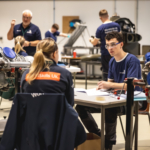Very few people would say that skills aren’t important. Whether you want to make sure young people gain the skills they need to prosper in their careers, ensure employers have a talented labour market to draw on for their business, or secure the UK’s reputation as an attractive destination for foreign investment. Building world-class skills systems in the UK is almost universally acknowledged as the right thing to do.
The more difficult question is how.. Governments are simultaneously criticised for inaction and ‘initiative-itis’ and we know apprenticeships and technical education routes don’t have anywhere near the same respect and esteem attached to them as academic options.
A recent report by Neil Bates for FETL addresses this question by shifting the attention to the importance of workforce development to help boost standards and quality in a very useful contribution to the debate ‘A world-class workforce for world-class skills’. The report also recognises the pockets of excellence across the UK that have been created by WorldSkills UK; a reference to our network of training managers who take technical education to a higher level when preparing young people for international skills competitions.
But “pockets of excellence” are not enough and frankly, our young people deserve better. We must find solutions and I believe that our track record in training young people to truly world-class standards, and our unique position within the global WorldSkills network means that we can play a really important role in raising standards in technical education across the board.
Research carried out by Dr Susan James Relly of Oxford University for WorldSkills UK last year ‘Good people in a flawed system’ reaches many of the same conclusions. Pockets of excellence occur where there is strong and supportive leadership, and where creativity is allowed to flourish. Our training managers know what excellence looks like and how to train to that standard, but the system is geared towards competence.
As Neil points out, the Department for Education has forecast a decline in the UK’s position in the intermediates skills rankings from 22nd to 28th out of 33 OECD countries by 2020. A clear indication that the trend is going in the wrong direction. The WorldSkills movement provides a different international benchmark to measure the UK’s skills performance. At last year’s skills Olympics in Kazan, where the UK was competing against 62 other countries, we came 12th (not 28th) in the medal table and we know we can do even better than that – we have held a top ten position for the last decade. This illustrates the difference between the pockets of excellence where competition involvement, creativity and innovation can drive up standards and the rest of the system.
This is why we are developing plans, not dissimilar to those that Neil’s report for FETL puts forward, to transfer our know-how and skills excellence training methods to more institutions to boost workforce development and so more young people can benefit from excellence in training and assessment. It’s also why we are also thinking about whether we should seek to host WorldSkills in the UK in the next decade to help act as a catalyst for mainstreaming excellence in skill systems. I believe all this could have a huge benefit for institutions, FE professionals, young people and ultimately employers, helping to create the world-class skills systems we need to succeed economically.


